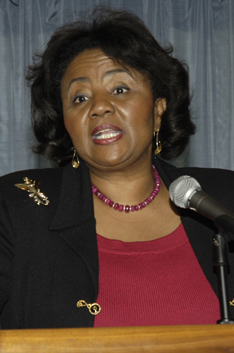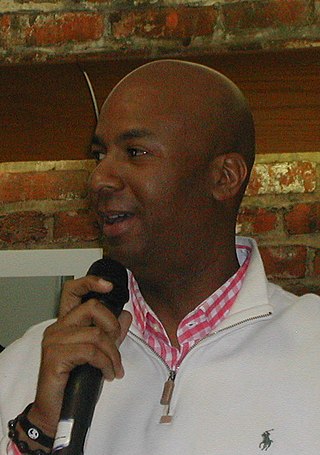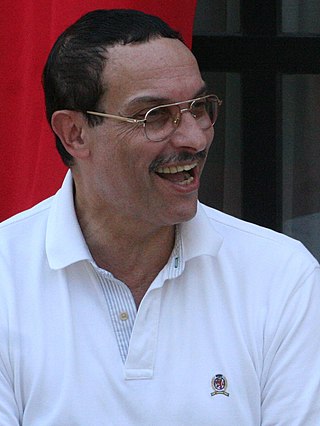Related Research Articles

Marion Shepilov Barry was an American politician who served as mayor of the District of Columbia from 1979 to 1991 and 1995 to 1999. A Democrat, Barry had served three tenures on the Council of the District of Columbia, representing as an at-large member from 1975 to 1979, in Ward 8 from 1993 to 1995, and again from 2005 to 2014.

Carol Schwartz is an American politician from Washington, D.C., who served as a Republican at-large member on the Council of the District of Columbia from 1985 to 1989 and again from 1997 to 2009. A five-time perennial candidate for mayor, she is the only Republican nominee since the restoration of home rule to garner more than 30 percent of the vote. She announced her fifth campaign for mayor on June 9, 2014 finishing behind Muriel Bowser and David Catania. In 2015, she was appointed to the D.C. Board of Ethics and Government Accountability by Mayor Muriel Bowser.

Philip Heath Mendelson is an American politician from Washington, D.C. He is currently Chairman of the Council of the District of Columbia, elected by the Council on June 13, 2012, following the resignation of Kwame R. Brown. He was elected to serve the remainder of Brown's term in a citywide special election on November 6, 2012, and re-elected to a full term in 2014 and 2018.

Linda Washington Cropp is an American politician from Washington, D.C., the capital of the United States. She was a Democratic member of the Council of the District of Columbia, where she was the first woman to serve as the elected Council Chairman. On September 12, 2006, she lost the Democratic Primary for Mayor to Adrian Fenty. This loss came in spite of the fact that Cropp had been endorsed by outgoing mayor Anthony A. Williams. She was succeeded as Council Chairman by Vincent C. Gray.

Vincent Bernard Orange, Sr. is a former American politician from Washington, D.C., and former president of the D.C. Chamber of Commerce. An attorney and a certified public accountant, Orange represented Ward 5 on the Council of the District of Columbia from 1999 to 2007, and was an at-large member from 2011 to 2016. He lost the June 2016 Democratic primary election to Robert White. Although his term was not due to end until January 2, 2017, Orange resigned from the council effective August 15, 2016, in the wake of conflict of interest charges over his new employment at the Chamber of Commerce.

Michael Arrington Brown is an American politician in Washington, D.C. In 2008, he was elected an at-large member of the Council of the District of Columbia, and he served one four-year term.

Michael Donald Brown is an American politician serving as the junior United States shadow senator from the District of Columbia, having served since 2007.

Muriel Elizabeth Bowser is an American politician serving since 2015 as the mayor of the District of Columbia. A member of the Democratic Party, she previously represented the 4th ward as a member of the Council of the District of Columbia from 2007 to 2015. She is the second female mayor of the District of Columbia after Sharon Pratt, and the first woman to be reelected to that position.
Harold Brazil is a former attorney and Democratic politician in Washington, D.C.
Willie J. Hardy was a Democratic politician and activist in Washington, D.C. She was elected as one of the original members of the Council of the District of Columbia in 1974 when D.C. gained home rule. She represented Ward 7 on the council from 1975 to 1981.

On November 2, 2010, Washington, D.C., held an election for its mayor. The primary elections occurred on September 14. Vincent Gray won the general election by a wide margin, although many voters wrote in incumbent Mayor Adrian Fenty, whom Gray defeated in the primary.

The Libertarian Party of the District of Columbia is a political party in the United States active in the District of Columbia. It is a recognized affiliate of the national Libertarian Party.

Anita Bonds is an American Democratic politician in Washington, D.C. She is an at-large member of the Council of the District of Columbia. She served as the Chair of the District of Columbia Democratic Party from 2006 to 2018. She worked as an executive at Fort Myer Construction, a District contractor.
LaRuby Zinea May is an American politician and African American lawyer who formerly represented Ward 8 on the Council of the District of Columbia in Washington, D.C. She won the Ward 8 special election on May 10, 2015, succeeding Marion Barry, who died in office on November 23, 2014. May, who was sworn into office on May 14, 2015, served out the remainder of Barry's term, which ended on December 31, 2016. During her first council term, she was active on the issues of crime and violence, marijuana policy, assisted suicide, and improvements to Advisory Neighborhood Commissions. She criticized the city's emergency medical services department, opposed the creation of a public electrical utility, and applauded the construction of a sports arena in her ward. She was one of the few council members to support the mayor during the FreshPAC scandal, and although she asked Congress to end its school voucher program she also supported a political action committee which supports an expanded voucher and charter school program in the District. She is a member of the Democratic Party.
The Umoja Party was a far-left political party in the District of Columbia.
The Socialist Workers Party of the District of Columbia is a minor political party in the District of Columbia The party advocates for statehood for the District of Columbia and ending Congressional control over the District's laws and finances. The party wants to abolish capitalism and replace it with a socialist economy.
Trayon White is an American Democratic politician, currently serving as a member of the Council of the District of Columbia, representing Ward 8 of the District of Columbia. Before entering politics, he worked as a grassroots organizer and activist in the communities he would later represent on the Council. He won election to the Council in 2016, his second attempt for the seat held by Marion Barry until Marion's death.

Robert C. White Jr. is an American attorney and politician who has served on the Council of the District of Columbia since 2016.

Calvin H. Gurley is an accountant and perennial candidate living in Washington, D.C.

On November 8, 2022, a general election was held for the Council of the District of Columbia. Elections were held in four ward districts as well as for Chairperson of the council and two at-large seats.
References
- 1 2 3 4 5 6 7 8 9 Valentine, Paul W. (October 30, 1978). "Aggressive U.S. Labor Party Making Inroads in District". The Washington Post. p. C5.
- 1 2 3 4 5 6 7 8 9 Valentine, Paul W. (March 23, 1974). "Campaign Chief Hired For Washington Race". The Washington Post. p. D4.
- ↑ "Four Candidates Running for Office of Mayor: Pennington". The Washington Post. November 2, 1978. p. DCA1.
- 1 2 3 Coleman, Milton (July 9, 1978). "D.C. Candidates Stump in Virginia". The Washington Post. p. C2.
- 1 2 Rippeteau, Jane (November 2, 1974). "Labor Candidate Links D.C. Problems to World". The Washington Post. p. B7.
- 1 2 "Six Complete to Represent District to Capitol Hill". The Washington Post. October 27, 1974. p. E2.
- ↑ "Sample Ballots". The Washington Post. October 30, 1974. p. B7.
- ↑ Bright-Sagnier, Barbara (November 6, 1974). "Fauntroy Outpaces Six Rivals, Wins 3d Term as D.C. Delegate". The Washington Post. p. A11.
- ↑ Robinson, Gall (August 7, 1975). "Picking Up Petitions in D.C. School Board Race". The Washington Post. p. DC3.
- 1 2 Camp, Patricia (October 21, 1975). "6 Seeking Kemp's School Board Seat: 6 Seek Kemp's School Board Seat". The Washington Post. p. A17.
- ↑ Camp, Patricia; Daniels, Lee A. (October 29, 1975). "School Board Candidates Give Views". The Washington Post. p. A19.
- ↑ Camp, Patricia; Daniels, Lee A. (November 5, 1975). "School Board's Morris Bows to Featherstone". The Washington Post. p. A19.
- 1 2 "Tradition of low-key campaigns upheld". The Washington Post. October 28, 1976. p. DC4.
- ↑ Milloy, Courtland (October 30, 1976). "5 D. C. Delegate Candidates Vary Widely on Ideologies". The Washington Post. p. E2.
- ↑ Lynton, Stephen J. (November 4, 1976). "Fauntroy Strengthens Position With Good Showing on Ballot". The Washington Post. p. C7.
- ↑ "D. C. General Election: D.C. City Council At-Large", District of Columbia Board of Elections and Ethics, November 13, 1976
- ↑ "Council". Washington Evening Star. September 15, 1976. p. B6.
- ↑ "11 Candidates File for Election To Fill At-Large Council Seat". The Washington Post. May 21, 1977. p. B2.
- 1 2 3 4 Valentine, Paul W.; Davis, Ron (July 11, 1977). "The Issues: 10 Candidates for Council Take Stand on Variety of Questions Before July 19 Vote". The Washington Post. p. C1.
- 1 2 Coleman, Milton; Morgan, Thomas (July 16, 1977). "Council Candidates: The Reasons They Are in the District Race". The Washington Post. p. B3.
- 1 2 Coleman, Milton (September 1, 1977). "20 Will Run For Seats on School Board: Five Candidates File for At-Large Vacancies Nov. 8". The Washington Post. p. C1.
- ↑ Coleman, Millon; Morgan, Thomas (July 20, 1977). "Mason Leading Sixemore: City Council Election Hilda Mason Leading Barbara Sizemore for City Council Seat". The Washington Post. p. A1.
- 1 2 3 "D.C. Opens Primaries to 2 Minor Parties By Jack Eisen". The Washington Post. June 29, 1978. p. DC3.
- 1 2 3 "Sample Ballot". The Washington Post. September 7, 1978. p. DC9.
- 1 2 3 Pennington, Susan (September 7, 1978). "U.S. Labor Party Candidate Bids for Mayor's Post Susan Pennington". The Washington Post. p. DCV3.
- ↑ Valentine, Paul W. (September 9, 1978). "Vote Security Operations Set: D.C. Candidates Set Elaborate Plans for Vote Security". The Washington Post. p. C1. ProQuest 146896059.
- 1 2 3 Eisen, Jack (October 13, 1978). "D.C. Ballot Order Established By Election Board Drawing". The Washington Post. p. C3.
- 1 2 3 4 5 6 Eisen, Jack (December 14, 1978). "The Official Returns From Elections Board On City's Nov. 7 Voting". The Washington Post. p. DC2.
- ↑ Eisen, Jack (March 1, 1979). "28 Candidates File For City Elections By". The Washington Post. p. DC2.
- 1 2 3 4 5 6 7 "Candidates for At-Large City Council Seat". The Washington Post. April 26, 1979. p. DC7.
- ↑ Coleman, Milton; Bredemeier, Kenneth (May 2, 1979). "Mayor's Choice, John Ray, Wins City Council Seat: Ray Defeats Moore, 9 Others to Win Council Seat". The Washington Post. p. A1.
- ↑ Coleman, Milton (November 4, 1979). "In the District, City Politics Colors Race: Politics Colors District School Race". The Washington Post. p. B1.
- 1 2 3 4 "District Voter's Guide: School Board School Board". The Washington Post. November 1, 1979. p. DCA1.
- ↑ "District School Board Elections". The Washington Post. November 8, 1979. p. C2.
